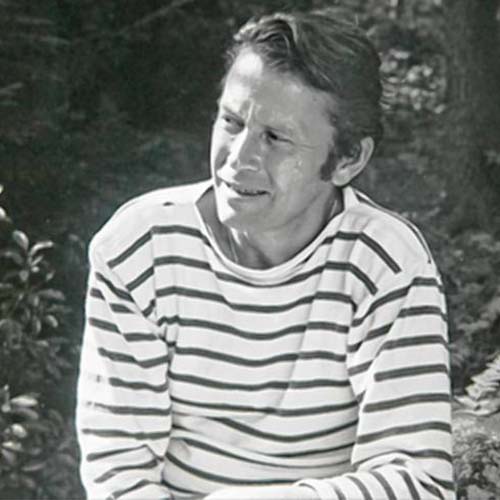Visiting Poets
Richard Wilbur
Richard Wilbur is the only living American poet to have won the Pulitzer Prize twice. The second Poet Laureate of the United States and recipient of countless honors and awards, including the Bollingen Prize, two PEN translation awards, and two Guggenheim Fellowships, he has displayed consistent eloquence and artistry over a career that spans more than half a century.
After a “rather solitary” childhood in the New Jersey countryside, Wilbur attended Amherst College and Harvard University. Having spent several college summers as a “privileged hobo” hitchhiking and riding the rails, followed by stints as a cryptographer and an infantryman in the Army during WWII, he brought to his poetry the richness of life experience, as well as formal education. Wilbur’s first book, The Beautiful Changes, was published in 1947 to much critical acclaim; the publication of the second, Ceremony and Other Poems, cemented his reputation as America’s finest poet writing in traditional meters and forms. Wilbur once said in an interview: “If one chooses form rightly, one is not submitting to the demands of the form but making use of it at every moment. . . . [and] the very words we use if we are writing careful poetry engage us . . . in a conversation with all the poetry that has ever been written”.
Wilbur’s varied literary output of over thirty-five books has included poetry, prose, children’s books, a collection of essays, plays, translations, and editorial work on the collected poems of Shakespeare and Poe. The most prolific and gifted translator of Molière world-wide, Wilbur is credited with the explosive revival of his plays in North America, beginning in 1955 with The Misanthrope. Wilbur’s translations of Molière, Racine, Apollinaire, and others, are widely praised for incorporating the spirit of both language and author, while maintaining the original form and rhyme scheme.
Having served on the faculties of Harvard, Wellesley, Wesleyan, and Smith (where he is Poet Emeritis), Wilbur is now retired from teaching, and lives in Cummington, Massachusetts and in Key West, Florida. His new book of poems is Mayflies.
Select Poems
In her room at the prow of the house
Where the light breaks, and the windows are tossed with linden,
My daughter is writing a story.
I pause in the stairwell, hearing
From her shut door a commotion of typewriter-keys
Like the chain hauled over a gunwale.
Young as she is, the stuff
Of her life is a great cargo, and some of it heavy:
I wish her a lucky passage.
But now it is she who pauses,
As if to reject my thought and its easy figure.
A stillness greatens, in which
The whole house seems to be thinking,
And then she is at it again with a bunched clamor
Of strokes, and again is silent.
I remember the dazed starling
Which was trapped in that very room, two years ago;
How we stole in, lifted a sash
And retreated, not to affright it;
And how for a helpless hour, through the crack in the door,
We watched the sleek, wild, dark
And iridescent creature
Batter against the brilliance, drop like a glove
To the hard floor, or the desk-top,
And wait then, humped and bloody,
For the wits to try it again; and how our spirits
Rose when, suddenly sure,
It lifted off from a chair-back,
Beating a smooth course for the right window
And clearing the sill of the world.
It is always a matter, my darling,
Of life or death, as I had forgotten. I wish
What I wished you before, but harder.
From NEW AND COLLECTED POEMS (Harcourt, 1988)
The eyes open to a cry of pulleys,
And spirited from sleep, the astounded soul
Hangs for a moment bodiless and simple
As false dawn.
Outside the open window
The morning air is all awash with angels.
Some are in bed-sheets, some are in blouses,
Some are in smocks: but truly there they are.
Now they are rising together in calm swells
Of halcyon feeling, filling whatever they wear
With the deep joy of their impersonal breathing;
Now they are flying in place, conveying
The terrible speed of their omnipresence, moving
And staying like white water; and now of a sudden
They swoon down into so rapt a quiet
That nobody seems to be there.
The soul shrinks
From all that it is about to remember,
From the punctual rape of every blessed day,
And cries,
“Oh, let there be nothing on earth but laundry,
Nothing but rosy hands in the rising steam
And clear dances done in the sight of heaven.”
Yet, as the sun acknowledges
With a warm look the world’s hunks and colors,
The soul descends once more in bitter love
To accept the waking body, saying now
In a changed voice as the man yawns and rises,
“Bring them down from their ruddy gallows;
Let there be clean linen for the backs of thieves;
Let lovers go fresh and sweet to be undone,
And the heaviest nuns walk in a pure floating
Of dark habits,
keeping their difficult balance.”
From NEW AND COLLECTED POEMS (Harcourt, 1988)

